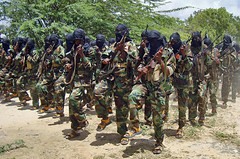
Somalia resistance forces in formation. The U.S.-backed Transitional Federal Government has suffered another blow in the aftermath of the resignation of the Prime Minister with the withdrawl of support by a pro-TFG militia group on September 25, 2010.
Originally uploaded by Pan-African News Wire File Photos
Ahlu Sunna Waljamaca's withdrawal days after PM resigns is likely to weaken the government's push against armed groups
Last Modified: 25 Sep 2010 21:37 GMT
The government was hoping the ASWJ would help to push back al-Shabab, which controls much of the country
An armed group that signed a power-sharing deal with Somalia's government has withdrawn from the UN-backed transitional administration, just days after the prime minister quit over a dispute with the president.
Ahlu Sunna Waljamaca (ASWJ), which joined the battle against al-Shabab and other armed groups seeking to topple the government in March this year, announced on Saturday that it would no longer be part of under fire administration.
Sheikh Abdullahi Sheikh Abu Yusuf, the spokesman for ASWJ, told the Reuters news agency that the government had failed to meet certain agreements reached as part of the power-sharing deal.
"From now on, we as Ahlu Sunna Waljamaca declare that the treaty we have signed with the government in Addis Ababa has ended," Yusuf said.
"The government itself has caused that. We were not in [Prime Minister Omar Abdirashid] Sharmarke's government or any other next government. We shall continue fighting against the al-Shabab and Hizb ul-Islam to keep our controlled areas peaceful."
ASWJ had no cabinet members in the government of the departed prime minister despite being promised five when they joined earlier this year.
Internal divisions
Before signing a deal with the government, ASWJ had pushed back al-Shabab and Hizb ul-Islam in central Somalia, and its entry into government was meant to help defeat those fighters.
Their exit is likely to further weaken the government's push against the groups, and herald more of the internal divisions that have beset the Transitional Federal Government and slowed government business.
ASJW, which is made up of Sufi Muslims,has warned that the departure of Sharmarke last week will only worsen Somalia's insecurity.
"We urge holding a reconciliation conference to bring Somalis together to get an effective authority that can rid the country of terrorists and foreign fighters," Yusuf said.
Armed groups have been fighting the government since the start of 2007 and the Western-backed administration has been hemmed into a few blocks of the capital Mogadishu since a rebel offensive last May.
Al-Shabab fighters have stepped up their offensive to topple the government in the last six weeks. A suicide bomber blew himself up outside the presidential palace compound on Monday night, wounding two peacekeepers.
Using suicide bombers, the group has killed five government ministers and dozens of AU peacekeeping troops over the two last years. Al-Shabab was also behind attacks in Uganda in July that killed at least 79 people.
Source: Reuters
No comments:
Post a Comment